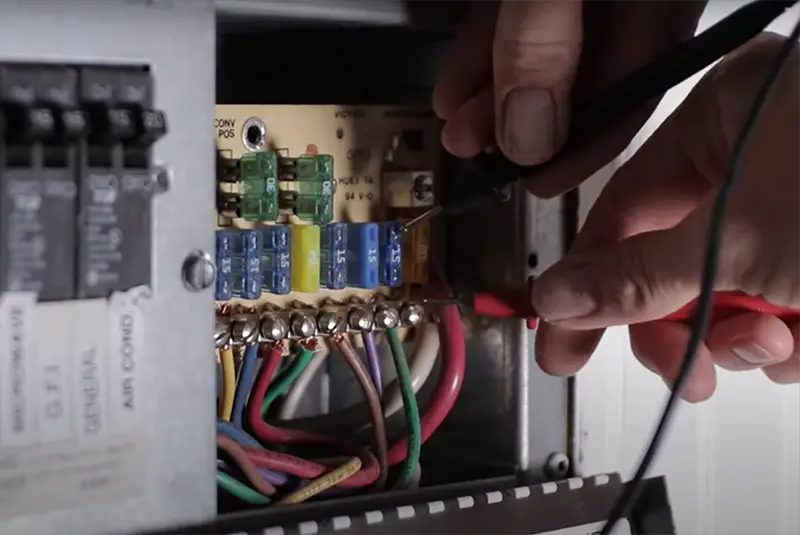4 Main Sources for RV Electrical and Vital Upgrades
The electrical system is among the important components of your RV trailer.
See, whether you’re out for a multi-week boondocking trip or camping for a couple of days not far away from home, you need reliable power.
Unfortunately, the OEM RV electrical systems provide just a bit of power, which is, in most cases, less-than-ideal reliable power.
If you, for example, harbor aspirations for a full-time off-grid living, the basic but standard power setup may not work for you.
The good news is I’ve outlined a functional description of how to upgrade your RV’s electric system.
BROWSE RV ELECTRICAL COMPONENTS AND UPGRADES
The Big Picture
As with most RV upgrades, the ideal electrical solution will depend on your needs. You’ll hardly find the “best” RV electric solution; instead, it all comes down to tradeoffs. Consider what’s important to you, and what you’re willing to forego.
In my opinion, the best way to determine the ideal electric system is by learning through experience what works for you.
It’s particularly important if you’re new to RVing and don’t have any electrical system knowledge.
Here’re some of the vital elements I feel you should account for when selecting an RV electric system:
Number and Nature of RV Appliances
The most important element is figuring out what you need your RV electrical system for.
For example, some RVers would want to run their RVs like a “normal” house, running everything from kitchen appliances, TVs, Air conditioning, and fan to water pumps. In this case, your electrical consumption will be higher.
Others, like me, tend to be conservative in our electrical consumption and will even turn off the lights when they’re not needed.
Source of Power
Generally, RVs generate power in four main ways.
- Shore power: Simply plug your RV at an external power source in a campground
- Generator: Runs on gasoline or propane and generates 120V AC power
- Tow vehicle: It draws power from a vehicle engine through the 7-pin trailer connector
- Solar panels: The roof-mounted solar panels harness energy for the sun
What Power to Use & Where (Different scenarios)
If you desire to boondock or completely go off-grid, the shore power could occasionally get your RV batteries charged, but it’s something you can’t rely upon daily.
Generators are a great energy source, but unless you’ve a 25ft trailer, it may limit you in terms of space and weight. The generator and fuel can be a bulky addition to your RV. It’s not to mention the inconvenience of dealing with the generator hum.
Charging batteries from a tow vehicle seems like a rad idea, especially if you’ll often tow your trailer. In this case, you need to upgrade your RV with a 7-pin connector.
An increasingly popular option is solar panels. It’s something I recommend RVers integrate into the electrical system.
I prefer to use the solar system as a supplemental source of energy. It’s great, but not a form of energy you can always rely on, especially in the hazy winter weather.
Safety
The biggest weakness of most RVs is the electrical system.
As you work through the RV electrical installation, you’ll likely find many opportunities to improve the existing connections and wiring.
Now, remember your RV is a second home, and therefore safety is paramount. I’d recommend you rely on the guidance of the National Electric Code (NEC) and American Boat and Yacht Council Standards (AYBC Standards) for any RV electrical code installation.
Disclaimer: Mistakes in the electrical system can be fatal, and if you’ve doubts about working on the electrical upgrade, consult a professional.
BROWSE RV ELECTRICAL COMPONENTS AND UPGRADES
Space and Weight
If you live in a big Class A motorhome, skip to the next section. However, keeping the electrical system small and subtle is crucial if you RV in a small Class B trailer with limited space and weight capacity.
Batteries, in particular, can be bulky and gobble up much of the coveted RV floor space. Therefore, pay attention to your trailer’s space and weight limitations before upgrading.
Maintenance
Most RVers desire an electrical system they can forget about once installed. It’s a wishful thought.
The truth is that whatever electrical system you install, periodic maintenance checks are necessary. If you’ve a battery, it may entail topping up the water regularly.
Simplicity
I’m an accomplished electrician and always happy dealing with technical systems. But the thing I dislike most about RV electrical systems is navigating through a complex system.
See, there’re infinite ways to make your RV’s electrical system complex, but it will only make things harder for you regarding operation and maintenance.
My ideal system is simple and correspondingly straightforward to use.
Cost
Keeping the RV electrical costs manageable is important. However, this doesn’t mean compromising on quality.
I understand you could do it for a much lower cost and everything, but always bear the safety and functionality aspects in mind.
You could save a lot by designing and installing the system.
Electrical Upgrade Plan
Add a Solar Panel
I’m a big proponent of solar power, and I wish all RVs came prewired with a solar at the roof. Installing a solar panel on your roof is one of the ways of making your RV more self-abundant when boondocking.
However, I would only recommend solar panels to supplement your energy needs. The panels don’t need gas, are noiseless, and are renewable. However, they also require good sun exposure, which may or may not happen.
Unless you’ve a massive solar array, battery bank, or minimal power needs, it’s challenging to be completely solar-reliant.
So, before installing the solar panels, consider how long you boondock and your power usage.
For example, if you run the AC, microwave, and other electronics such as TV, you’ll need an appropriately-sized inverter.
Next, evaluate everything that will run on the DC system, such as the fridge, fan, water pump, etc. Come up with the total number of amps you need to use for the day to size your solar needs.
[amazon box=”B09W5HTGTY”]
Upgrade The Battery Pack to Lithium Battery
Solar panels are great, but not worth it when coupled with a crappy battery. For most RVers, I suggest they spend their money on the foundation first.
Upgrading the RV battery may not be the sexiest upgrade you can imagine, but it’s certainly among the most important RV electrical upgrades.
Most rigs come with a single 12V lead-acid battery. It’s fine for keeping the lights on and probably the electrical part of a fridge, but no more than that.
Adding more battery capacity or a different RV battery is the best mod I can think of if you need more battery performance.
Lead-acid batteries are standard in many RVs, thanks to their price. However, they charge slowly and need continuous maintenance.
My go-to suggestion would be lithium-ion batteries. The LFP RV batteries have plenty of significant benefits, including a much longer service life and better performance.
They’re also safer and maintenance-free and will support high-speed charge and discharge. While their prices are slightly higher, they usually offset the cost with their longevity.
[amazon box=”B09F9NNGN8,B075RGX1WR,B084C3VZRY”]
Buy a Portable Generator
Most basic travel trailers don’t come equipped with gasoline generators.
However, if you plan to dry camp, you’ll need a portable generator. Remember that even with solar, there’re inevitable times when you need extra juice to run your appliances.
My recommendation is an inverter RV generator such as Honda EU2000i. It’s relatively cheap, efficient, and quiet.
[amazon bestseller=”duel fuel portable generator” items=”2″]
[amazon box=”B09TL34XZ1″]
RV Battery Monitor
An RV monitor is exactly as its name suggests. It monitors the performance of your RV electric systems.
Much like the fuel gauge to your car, an RV monitor provides the information you need about the battery amperage, wattage, and current to help your RV run efficiently.
It keeps you in the loop about your battery’s performance and state of charge so you don’t run out of power in the middle of a cold night.
Monitoring the charge level and current is also essential to preserving the battery life and longevity.
[amazon bestseller=”rv battery monitor” items=”2″]
Add a Signal Booster
A signal booster is important, especially for full-time personnel who need to work on the road.
It’s also important when you need to call or access the internet and are frustrated by the limited service or low connection.
Having signals is critical for me as I need to share my van life and experiences with my social followers anytime, anywhere.
It also gives me the confidence and assurance that I can always get in touch with civilization in case something goes wrong.
[amazon bestseller=”rv signal booster” items=”2″]
Hard-Wired Electrical Management System
It’s common for campgrounds to have spotty power connections. Low voltage issues can easily damage your RVs electric componentry, whether from an old or overloaded system. The surges and mis-wirings are also a potential fire threat.
The good news is you can avoid all these issues with a hardwired electrical management system. It’s similar to a surge protector and catches all the electric issues before entering your RV.
Backup Camera
Backing up a travel trailer is challenging, but an easy upgrade, such as a backup camera, can make all the difference.
And the good thing is most modern trailers come prewired for the camera, making the installation super easy.
[amazon bestseller=”RV BACK UP CAMERA” items=”2″]






